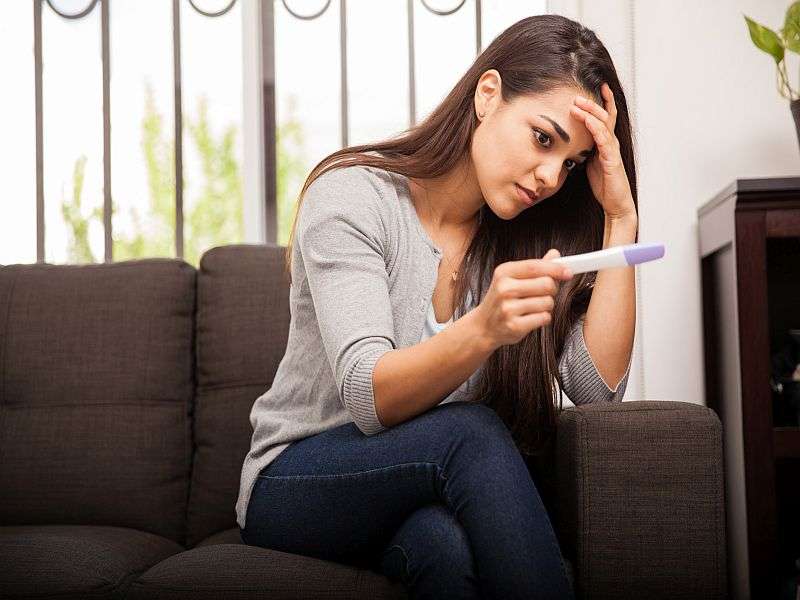Self-harm a cause of death during pregnancy and for new moms

(HealthDay)—In the past decade, "self-harm" has been the leading cause of pregnancy-related deaths in Colorado, a new study finds.
Of all 211 maternal deaths in Colorado between 2004 and 2012, 30 percent were attributed to self-harm. That included suicides and drug overdoses—most often in the year after a woman gave birth.
Self-harm was the most common cause of maternal deaths—ahead of car accidents, medical conditions and homicide, the researchers said.
It's not clear whether self-harm deaths are becoming more common, said lead researcher Dr. Torri Metz, a maternal-fetal medicine specialist at Denver Health Medical Center.
Nor is it known whether other U.S. states are showing the same pattern, she said.
But the results underscore the importance of screening pregnant women for depression, according to Metz.
Guidelines from the American College of Obstetricians and Gynecologists (ACOG) say that all women should be screened at least once for "perinatal" depression—symptoms that occur during pregnancy or in the first year after a woman gives birth.
But it's not clear how often that actually happens in the real world, Metz said.
Dr. Richard Silver is chairman of obstetrics and gynecology at NorthShore University Health System in Chicago.
"We think women should be screened for depression at multiple points, during and after pregnancy," Silver said, referring to the standard procedure at his center.
But, he added, that approach is probably "atypical."
And even at a large medical center with a focus on catching perinatal depression, there are women who slip through the cracks, Silver pointed out.
Part of the issue, he said, is that there is still some stigma connected to mental health disorders. Another is that many new mothers don't have the time—or, if they're severely depressed, the motivation—to make medical appointments for themselves.
According to Silver, mobile technology might be one way to start removing those obstacles.
He said his center is launching a new program that uses a computer-based tool to screen women for perinatal depression over their phones.
The new findings, published in the December issue of Obstetrics & Gynecology, are based on records of maternal deaths in Colorado between 2004 and 2012. They included both deaths during pregnancy or in the year afterward.
Overall, 63 women died of suicide or a drug overdose—considered either accidental or "undetermined." The most commonly detected drugs were prescription opioid painkillers, which include medications such as oxycodone (Oxycontin) and hydrocodone plus acetaminophen (Vicodin).
The fact that 30 percent of maternal deaths were attributed to self-harm is "just remarkable," said Catherine Monk, an associate professor of psychiatry, and obstetrics & gynecology at Columbia University Medical Center in New York City.
Monk, who was not involved in the study, said the researchers should be "commended" for bringing the issue of maternal mental health to the foreground.
She agreed that women can face major obstacles in getting the help they need during and after pregnancy.
When it comes to substance abuse, for instance, women may fear having their baby taken away, Monk said. Depending on state laws, that fear may be founded or not, she noted.
As for depression screening, it should be done more often than it usually is, according to Monk—especially when a woman has a history of depression going into pregnancy.
"A history of psychiatric conditions should be a red flag," she said.
But, Monk added, "screening alone is not enough."
Women also need access to treatment, she stressed—not only medication, but also behavioral therapy.
Metz's team found that of the 63 women who died of self-harm, just over half had documented mental health diagnoses—including six women with a previous suicide attempt.
And close to half of the 63 had been taking psychiatric medication when they became pregnant—mostly SSRI antidepressants. Many of those women stopped taking the drugs.
But while women may fear using medication during pregnancy, it's important for those on antidepressants to not just quit on their own, Metz said.
She advised talking to your doctor first.
Silver agreed, saying that women can choose to stay on their antidepressant. In any event, he said, the depression needs to be addressed.
"Don't feel guilty about how you feel, or the fact that you need help," Silver said.
Monk agreed. She also said that while it's important for women or their families to reach out for help, health professionals need to be proactive in assessing the mental well-being of pregnant women and new moms.
"The onus is on us," she said.
More information: The U.S. National Institute of Mental Health has more on postpartum depression.
Copyright © 2016 HealthDay. All rights reserved.

















